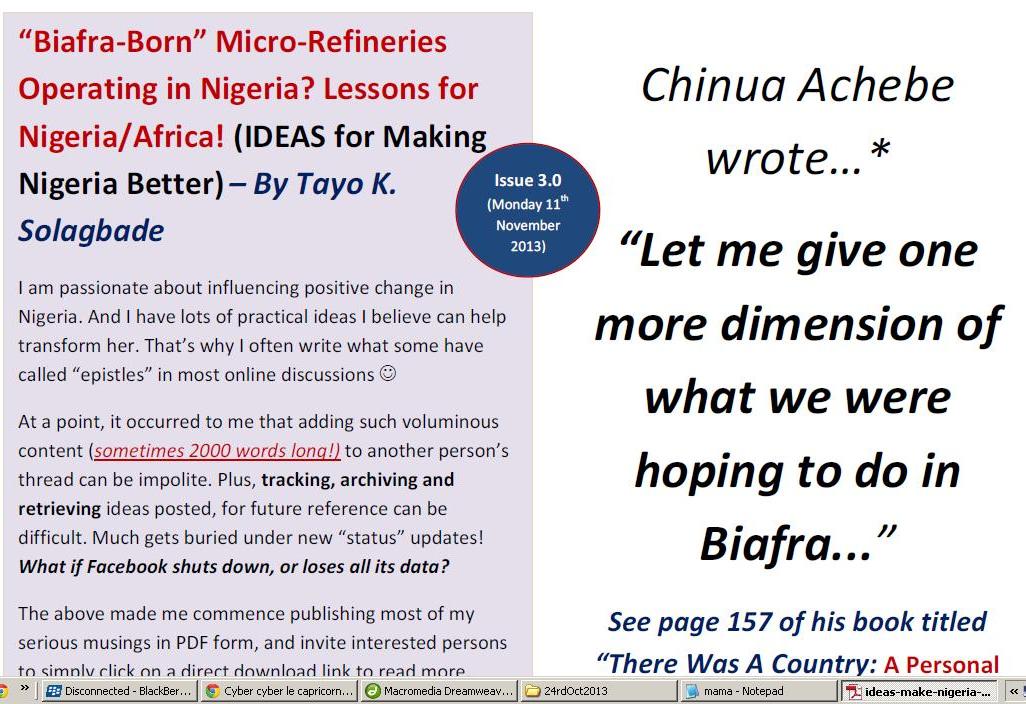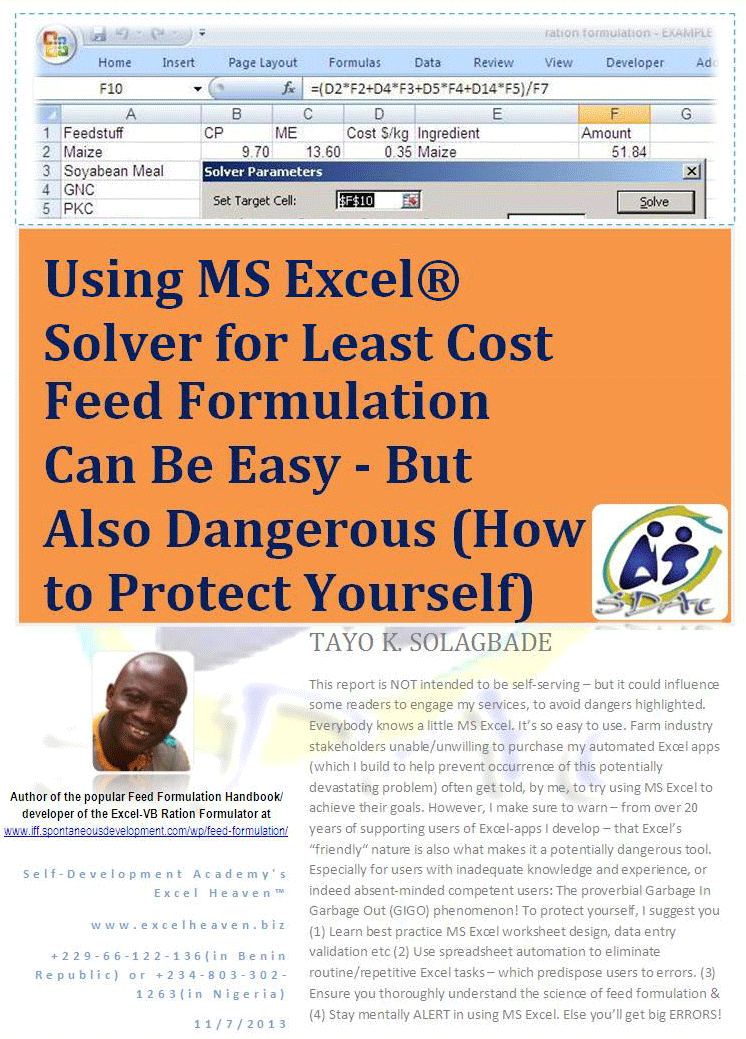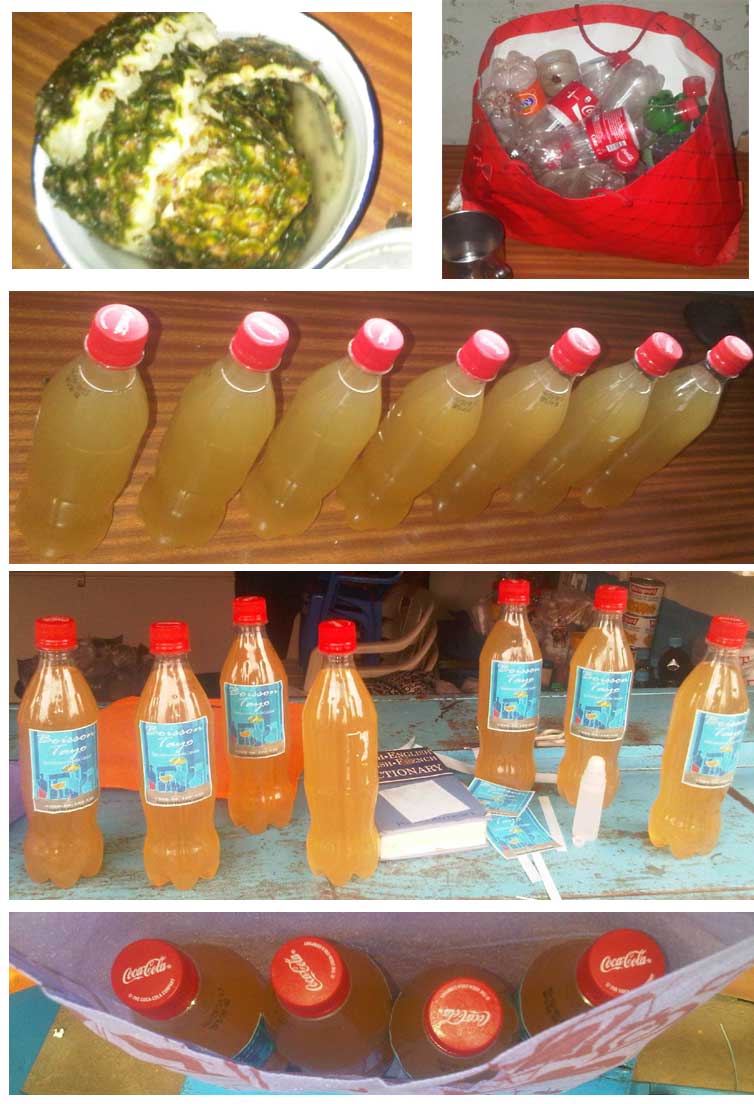Yes, that’s the key to good health, looking young, and LIVING LONG.
Sweating enables your body expel many “bad things” that can weaken it!
I took the photo below, this a.m (Friday 22nd Nov. 2013 at 10.00a.m):

I was doing my usual 20 to 30 minute walk, from my place at Barrière here in Cotonou, to a cyber cafe I frequent at the Etoile Rouge area.
As I approached Agontikon, next to the crossroad, a shop owner friend called out to me.
During our chat he kept asking “Ca va un peu?” (It’s a way of asking: “Everything okay?“) in apparent reference to (and concern about) my sweating.
I kept saying “Oui” (i.e. “Yes”) without adding any details …until it dawned on me to explain…
You see, every day (including Sundays), just before breakfast, I do seventy (70) push-ups – sometimes 100.
That’s followed by some yoga-style exercises for 10 to 15 minutes
After that, I eat and then WALK to the cyber cafe as part of a deliberate strategy to “exercise” my lower body.
When I get to my destination, I wipe myself clean of sweat using a towel I keep in my bag.
And my “exercising mission” for the day would have been accomplished!
I ended my explanation, by making the following statement to my friend:
“Si tu veux rester fort, et tu ne veux pas devenir vieux trop vite, il faut perspirer. C’est très important pour la santé!”
(Translation: “If you want to stay strong, and you don’t want to grow old too quickly, you need to sweat. It’s very important for the health!“)
For effect, I added:
“J’ai 43 ans” (Translation: I’m 43 years old”).
His jaw dropped, as he looked me over repeatedly…then he exclaimed:
“Ce n’est pas vrai” (Translation: Not true!).
As I walked away, I laughingly told him:
“C’est la verité (Translation: “It’s the truth”)
And he kept staring at me in what seemed a mixture of surprise and wonder.
If he’s smart, he’ll adopt a similar simple exercise regimen
And so will you, if you do not already do it.
It will keep your body in good form to withstand the daily wear and tear, from the activities and foods you expose it to!
In case you’re wondering, this strategy makes me super-productive. And I do not exaggerate.
One Example:
Last Saturday (16th Nov. 2013), I worked 13 straight hours from 9a.m till about 10.30p.m (without getting up, NOT even to drink water), to finish my 4,000 word agri-business case study paper – for entry into an international research paper writing contest. The paper is about the use of Excel-VB driven spreadsheet automation for Feed Formulation.
That same night, I sent it to my co-author Professor friend in North West University, South Africa.
From 7.30a.m Sunday morning, we spent about 2 hours on phone agreeing modifications. Then he sent the final version to the organisers in the Netherlands via email.
So now, we wait till Tuesday, when the judges will notify us about whether or not it’s been accepted.
[UPDATE (12th Sept. 2015): Should have done this way back in Dec. 2013, when the payment happened. But it kept slipping my mind. The paper did get approved, and I did get paid for it. Read this article: PDF Agribusiness Research Paper] Adoption of PC-Based Feed Formulation Methods by Farmers, Feed Manufacturers and Extension Professionals, in South West Nigeria – Complete my Questionnaire Survey & Download FREE PDF Copy]
The point I’m making is my diligent exercising enables me near-effortlessly get work done – to meet tight deadlines – even if I have to continue for long stretches of time. And I mean physical, as well as mental work.
You see, I believe that without my disciplined dedication to fitness, I could not have gotten that paper done, in combination with other work I had to do. And that included traveling to Nigeria to administer a questionnaire survey to farm business CEOs, and then returning to Cotonou to collate the data for use in the paper!
In truth, many much younger people often find it hard to keep up with me. As do my peers and older persons.
For instance, I’ve had clients and staff go round farm premises with me, after which we returned to the “farm office/house” for our meals.
Subsequently however, they struggled to keep their eyes open, as I tried to explain how the software I built for them worked 
The reason this happened was that they often lacked both physical and mental stamina, aka STAYING POWER.
People who succeed usually have STAMINA. If you want to succeed, YOU WILL NEED IT!
And to have it, you must commit to diligent exercising on a regular basis.
As a writer (or expert in any other field), it will boost your productivity tremendously. And your quality of work will also improve!
By the way, nothing I’ve said here is meant to be bragging.
I simply feel it’s important that I share with you a strategy that’s worked quite well for me, over the past 20 years now.
Yes, I’ve been doing it this way for over 2 decades – with great results to show for it!
You don’t need to become some physical fitness guru or anything.
And you’re not necessarily going to be aiming to win any competition against others here. What I refer to is the adoption of a disciplined habit of daily exercising.
In a past issue of my newsletter, I wrote on this same theme. It was titled: No. 94: Use Physical Fitness to Boost Your Productivity (4 Tips).
You should read it.
One last thing…
It might interest you to know, that ever since quitting competitive handball in 1992 (when I left the university), I’ve used this strategy to maintain my fitness right through paid employment, up till today.
Many who know me will confirm this.
And that’s why I’m this confident, that it works. So do use it 















